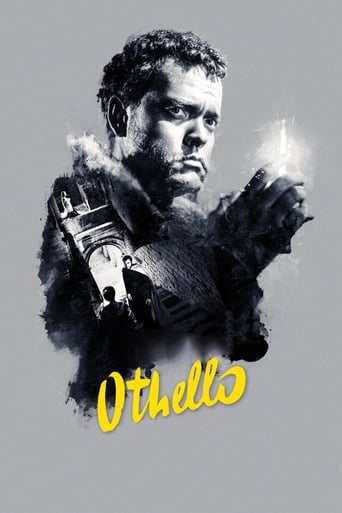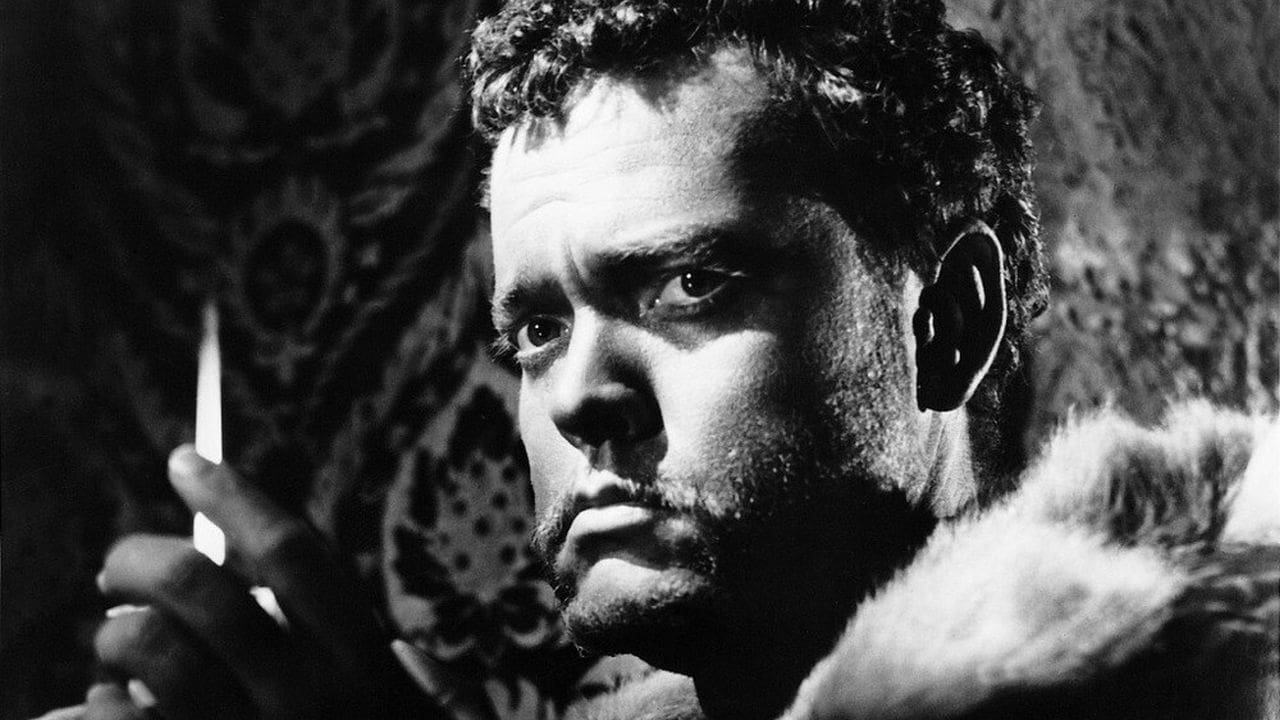Kirpianuscus
the mark of Oscar Welles. this is the basic virtue of film. the second - Oscar Welles himself as inspired Othello. and Emilia by Fay Compton. Micheal MacLiammoir seems give a mix of Richard III and Iago. and Desdemona...she remains a shadow with ambiguous traits. another virtue - the cinematography. and a new, convincing, lecture of Shakespeare. maybe, not the most inspired adaptation. but seductive, precise, impressive for details and for the way to use the text with force and grace.
Eric Stevenson
"Citizen Kane" was certainly a tough act to follow, which is why you're not familiar with most of Orson Welles' other films. I truly believe that you should check out all of his movies as most of them are great, but sadly not on the level of "Citizen Kane". Welles was rather fond of Shakespeare and had a great starring role. I have never seen an adaptation of "Othello" before or even read (or seen) the play performed. It actually fascinates me how it's easy to sum up. There's certainly a lot going on, but it's easy to summarize. Othello is being manipulated by Iago into thinking his wife is having an affair.The only Iago I was familiar with was the one from "Aladdin". It's great to be familiar with a character that many people consider one of the most classic villains in all of pop culture. The atmosphere is as great as you would expect it to be. It really did feel like a big epic movie even though it was only 93 minutes long. It's just hard to imagine such a great story condensed into that running time. This makes the pacing work wonderfully and it's so rewarding in the end. While not as good as his version of "Macbeth" still great. ***1/2
sharky_55
This adaptation of the Shakespearean tragedy manages to be compelling despite its infamous and troubled production. Othello's majestic coat lined with mink fur is none other than the same one stolen from the set of The Black Rose. Whole sequences seems missing and compositions and edits are at times jarring and sparse; ADR is visible in many instances. The moor's impressive army had to be cleverly concealed or else the truth would have been evident; nothing but a rag tag bunch of extras. The crucial death scene of Roderigo is shot within a bathhouse because of the lack of costuming. And Suzanne Cloutier's Desdemona seems perhaps a little thin compared to Welle's screen presence - then again, she was only the third actress cast in the role. But it is compelling all the same. The soundtrack's troubled restoration process does not take away from its presence. In one particular moment, right after Othello's mind has been corrupted by Iago's lies, he seeks to confront his guilty wife. As Desdemona floats into the frame, a demure flute tune sets the mood, but as Othello demands her hand to check if it is moist, the strings suddenly chime in ominously. It offers information alongside Welles' glare. A heavy piano note suddenly drops onto the track when Desdemona seemingly innocuously brings up the issue of restating Cassio, not knowing how damning this statement is in her husband's raging mind. And then they spar, with her not budging up the issue, and him demanding the handkerchief. Oh it's wonderfully ironic how at odds their intentions are. But Shakespeare has to be given credit for this confrontation. Here Othello is asking a question he already knows the answer to, condemning her even before she gives that fatal answer. Anything short of magically conjuring the handkerchief to show Othello (even that in itself might have been refused and called an act of witchcraft that Othello himself is initially accused of) is just confirming his suspicions. Early on in the film there is a narrator who introduces us to settings and happenings as if any viewer would not already be familiar with the famous Shakespeare play, but Welles wisely does away with him and his obtuse dialogue (then again, Welles' also does not include any of Iago's soliloquies which map out his plan like a step-by-step guide). The lines are cut heavily; despite being one of Shakespeare's longer works the film only clocks in at 91 minutes, nothing compared to some of the line-by-line mammoth adaptations that leave no word behind. There are some weird editing choices that accentuate this; Othello and Desdemona embrace and he whispers that they have but an hour to consummate their marriage, before we cut and suddenly it has been weeks at sea and they are eagerly reunited at Cyprus. But the narrative's most important moments remain and that is sufficient. It is not purely theatrical and relying on its performances; the film is full of disconcerting cinematography that is appropriate for the addled mind of Othello. There is no flat theatre stage here. When he slips into his trance, we get a reverse bird's eye of sorts, where we are looking directly up at the sky, and the camera spins and spins and spins as the upside-down crowd look up in puzzlement. The same disorientating effect is used when he is trapped in the room of his murder forever - the walls are blurred and closing in. The original play might prefer Iago to take the soliloquy spotlight, but Welles' visualises contemplation in his own way, by forcing the confusion and agony of his face back at him through the mirror. In a clever shot Iago is talking to Othello out of frame; oh but he is there anyway, in the mirror and seized up in concentration. Desdemona stares innocently right into the lens and into Othello's soul, and he later does the same to Iago; this technique effectively characterises his growing distress and unnerve. The lighting also aides this process; from the natural sun bathed beaches, Othello is then slowly enveloped by the darkness, until only his pupils, as green as can be even in the black and white film-stock, can be seen in the sunlight. In that final speech where he implores the men to record this story in an unbiased manner (although he himself shows signs of bias), his entire body save his face is wrapped by complete darkness. He has been enveloped and corrupted by his absolute jealously.
hte-trasme
Orson Welles' film version of Othello opens with the arresting and atmospheric images of the caskets of Othello and Desdemona being carried down a hill: it's a stark reminder of the tragic nature of what we are about to see, accompanied by the full affecting score that reappears throughout, and as visually striking as the rest of the film. What the making of this Othello was reportedly difficult as best by financial trouble, it looks lavish and extraordinary. The atmospheric black-and-white film-making on raging seaside locations, in a imposing castles, and at decadent festivals is brilliantly atmospheric, suspenseful, and almost supernatural. The celebrated tracking shot on the "I like not that" scene is very justly so.The flipside of this mesmeric and constantly fascinating composition and direction is that, in this very cinematic Othello, many cuts have been made, creating dynamic scenes but losing much of the subtlety in many of Shakespeare's scenes.The two impeccable things about this production are the ones directly under the control of Orson Welles -- the unforgettable look, and his performance as Othello. I was shocked to read he later doubted his casting if himself, since he's extraordinary in the part. He projects dignity, power, and good-fellowship, but also a kind of innocence and childlike trust. This really adds dimension to the play and is a missing piece in a lot of performances. Othello is a master at the warlike arts who is a little lost at sea he must deal face-to-face with other people, so his trust is all-or-nothing.While Micheál MacLiammóir seems a competent actor as Iago, I'm not sure I like his choices in the role. He plays up the sly, sinister, conniving aspects of Iago's character (at times even seeming to let Roderigo completely in on his malicious nature) without letting us see the charming aspects the explain how he is able to insinuate himself into everybody's affections. We are left wondering why all the other characters are being so nice to this obviously bitter and manipulative man. Robert Coote's Roderigo is also played as a little too dimwitted for my liking (though Orson Welles also subtly displays his acting prowess by filling in as Coote's voice,, doing well and without sounding obviously like Orson Welles playing two parts).This film has its flaws (including the much-publicized ones with dialogue on the soundtrack), but its strengths, especially the haunting way it is filmed and Orson Welles' masterpiece of a performance make this a film that shouldn't be missed.



 AD
AD




